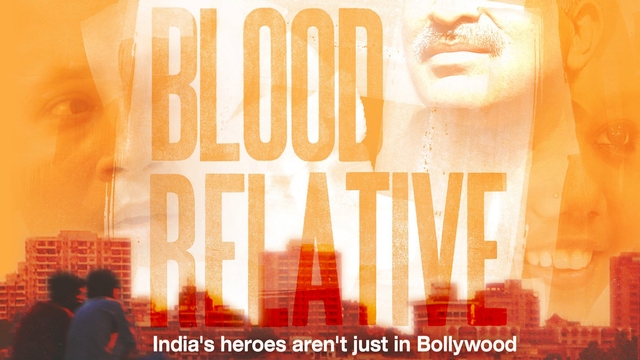Blood Relative
The disease that stops Indian kids growing up and the system that lets them die needlessly
 Divya (15) and Imran (24) are trapped in the bodies of small children. A rare disease stunts their growth, leaving them reliant on expensive medicine and unlikely to live much longer. Can their hero Vinay help them to defeat India's broken medical system?
Divya (15) and Imran (24) are trapped in the bodies of small children. A rare disease stunts their growth, leaving them reliant on expensive medicine and unlikely to live much longer. Can their hero Vinay help them to defeat India's broken medical system?


 "I would love to live longer for my mom and my sister", says Imran, who supports his family through his call centre job. Suffering from Thalassemia Major means that his body cannot generate blood on its own. Weekly blood transfusions help make up the lack; but they also create a deadly build up of iron in his body. It has to be removed with a drug called iron chelation, otherwise the excess iron stunts Imran's growth and damages his heart and liver. But the cost of the drug is often prohibitive; "Parents who cannot afford the iron disposal are actually letting their children die", warns health activist Vinay Shetty.
Shetty, better known as 'Vinay Uncle', is the only support point for Thalessemia-affected families in Mumbai. Funding secured through his Think Foundation allows him to give out iron chelation free of charge. "He's the father of all Thalassemia Major children in Mumbai", says one Thalassemia patient. But despite his incredible work, Shetty's relentless attempts to secure government funding for the drug from the Health Minister remain unanswered.
Unheeded, Shetty continues to educate about the disease on the ground. Visiting Divya's family, he explains why it is important for her to take iron chelation. Her mother has previously put faith in a spiritual healer to cure the girl of the disease. In this community traditional beliefs are hard to shake off. "You cannot erase what is written in your fate", says Divya's mother when she finds out her son carries a less dangerous form of the disease.
As funding gets cut and Imran contracts hepatitis C from a blood transfusion, Shetty remains a source of hope and positivity. He secures new funding for the foundation and digs into his own life savings for Imran's treatment. "Even with only one rupee left in the bank, Think Foundation is here to stay", insists Shetty.
LEARN MORE.
"I would love to live longer for my mom and my sister", says Imran, who supports his family through his call centre job. Suffering from Thalassemia Major means that his body cannot generate blood on its own. Weekly blood transfusions help make up the lack; but they also create a deadly build up of iron in his body. It has to be removed with a drug called iron chelation, otherwise the excess iron stunts Imran's growth and damages his heart and liver. But the cost of the drug is often prohibitive; "Parents who cannot afford the iron disposal are actually letting their children die", warns health activist Vinay Shetty.
Shetty, better known as 'Vinay Uncle', is the only support point for Thalessemia-affected families in Mumbai. Funding secured through his Think Foundation allows him to give out iron chelation free of charge. "He's the father of all Thalassemia Major children in Mumbai", says one Thalassemia patient. But despite his incredible work, Shetty's relentless attempts to secure government funding for the drug from the Health Minister remain unanswered.
Unheeded, Shetty continues to educate about the disease on the ground. Visiting Divya's family, he explains why it is important for her to take iron chelation. Her mother has previously put faith in a spiritual healer to cure the girl of the disease. In this community traditional beliefs are hard to shake off. "You cannot erase what is written in your fate", says Divya's mother when she finds out her son carries a less dangerous form of the disease.
As funding gets cut and Imran contracts hepatitis C from a blood transfusion, Shetty remains a source of hope and positivity. He secures new funding for the foundation and digs into his own life savings for Imran's treatment. "Even with only one rupee left in the bank, Think Foundation is here to stay", insists Shetty.
LEARN MORE.
WATCH MORE.
JOIN THE DISCUSSION.





